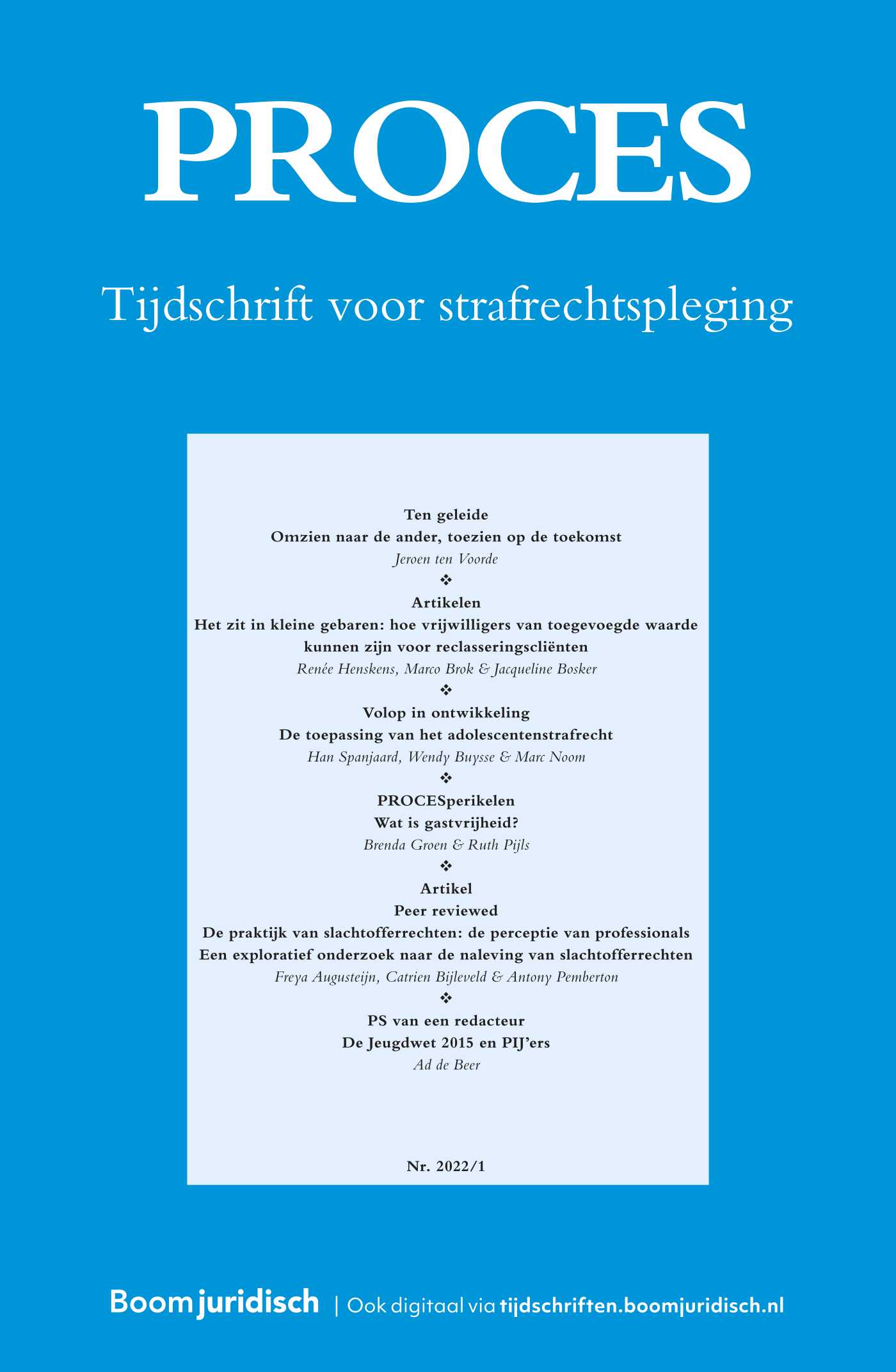|
Since 2005 article 273 of the Dutch criminal code does not only qualify exploitation of prostitutes as a criminal act, but also exploitation taking place in other sectors. Seven years down the line not much is known about this type of human trafficking. Based on an analysis of files of the Dutch Social Security Investigation and Detection Service (ISZW-DO) this article describes in which sectors such exploitation takes place, the characteristics of both victims and (alleged) perpetrators and the modus operandi used. The article concludes and emphasizes that especially subtle means of coercion are used, but that these can transform into more serious types of coercion. |


PROCES
Meer op het gebied van Criminologie en veiligheid
Over dit tijdschriftMeld u zich hier aan voor de attendering op dit tijdschrift zodat u direct een mail ontvangt als er een nieuw digitaal nummer is verschenen en u de artikelen online kunt lezen.
| Redactioneel |
Strafrecht in de uitverkoop |
| Auteurs | Mr. drs. Sigrid van Wingerden |
| Auteursinformatie |
| Artikel |
Op het land in plaats van achter het raamAard en omvang van arbeidsuitbuiting in Nederland |
| Trefwoorden | Human trafficking, Labour exploitation, Illegal migration |
| Auteurs | Daphne Postma MSc. en Dr. Joris van Wijk |
| SamenvattingAuteursinformatie |
| Artikel |
Maatregel of dubbele bestraffing?Het misleidende instituut van de vervangende hechtenis bij de schadevergoedingsmaatregel |
| Trefwoorden | Order for damages, Substituting detention, Convicted persons, Victim |
| Auteurs | An Klaasse en Mr. Sjoerd van Berge Henegouwen |
| SamenvattingAuteursinformatie |
|
When an order for damages – or ‘schadevergoedingsmaatregel’ – has been given in Dutch criminal proceedings, the administering judge subsequently has to order that if the convicted person fails to pay the order, so-called substituting detention will be applied (art. 36f par. 6 jo. 24c of the Dutch Criminal Code). This implies that persons who have been long-term convicted and/or have been placed at the disposal of the government (‘terbeschikkingstelling’) and who do not have the financial capacity to pay a substantial amount of the order for damages, need to undergo an inevitable substituting detention. Therefore, the term ‘substituting’ is misleading, since it does not eliminate the duty to pay the order for damages. For this reason, convicted persons with little financial capacity are de facto administered two punishments, the order for damages ánd the ‘substituting’ detention. Moreover, for both victims and society as a whole, the measure does not provide any solace. This article will discuss the legal and practical issues of the substituting detention related to the order for damages concerning convicted persons as well as the consequences for society and victims. |
| Praktijk |
Het stelsel Bewaken en Beveiligen, voorbeelden uit de praktijk |
| Auteurs | Mr. Ivo Laufenberg |
| Auteursinformatie |
| Artikel |
Landelijk Instrumentarium Jeugdstrafrechtsketen |
| Trefwoorden | Risk and needs assessment, Juvenile justice system, Recidivism |
| Auteurs | Drs. Han Spanjaard en Dr. Claudia van der Put |
| SamenvattingAuteursinformatie |
|
Risk and needs assessment of juvenile offenders is essential in order to determine which (intensity of) intervention is required. Both the application of the risk principle and the needs principle requires a reliable and valid assessment of the recidivism risk and of the criminogenic needs. Structured assessment instruments are necessary for this purpose. Therefore, a set of new instruments (Landelijk Instrumentarium Jeugdstrafrechtsketen, LIJ) is developed for the Dutch juvenile justice system. LIJ aims to improve the assessment of juvenile delinquents and the referral to appropriate evidence-based interventions. |
| Artikel |
Reclassering op een kruispunt(?)Rol en positie van de reclassering bij Forensisch Psychiatrisch Toezicht |
| Trefwoorden | Forensic Psychiatry, Probation service, General Mental Health, Forensic Psychiatric Supervision |
| Auteurs | Dr. Jaap van Vliet |
| SamenvattingAuteursinformatie |
|
The probation service has a legally firmly embedded mandate to guide the Tbs-patients (Forensic Psychiatric Patients, subject of a hospital order) during his return to society and to supervise this return. Also because of incidents with Tbs-patients who returned to society, a new way of guidance and supervision was recently developed, in which the treating clinic, the GGz (general mental health care institutions) and the probation service cooperated and enhanced each other’s expertise, more than had been customary in the past. The aim was to reduce the risk of re-offending as far as possible. The first part of this article deals about Forensic Psychiatric Supervision and the problems regarding the links between the judiciary circuit and the GGz. The second part outline the role of the probation service and is concerned with the importance ánd the danger of risk assessment and risk control. Some conclusions are drawn. |
| Artikel |
De nagebootste stoornis, gedragskundige en strafrechtelijke benaderingen |
| Trefwoorden | Factitious disorder, Münchhausen syndrome by proxy, Diagnosis, Prosecution |
| Auteurs | Dr. Dick Raes en Mr. Yvo van Kuijk |
| SamenvattingAuteursinformatie |
|
Factitious disorders are rather rare. Doctors are not inclined to take such a diagnosis into consideration. Basically, the term Münchhausen-syndrome is not correct, because the stories told by the baron were obviously unbelievable. The DSM IV-TR makes a distinction between malingering, factitious disorder and conversion hysteria. Four cases are shortly described, two with factitious disorder in adults, one with Münchhausen by proxy and one of apparent child abuse.Especially in Münchhausen-syndrome by proxy, clinical and juridical approaches come together in the diagnostic and the criminal investigative phase. Professionals from both disciplines have to work together to protect the wellbeing of the child and to find the adequate (forensic psychiatric) treatment for the mother. |
| Column |
Was ze nou vrij? |
| Auteurs | Mr. Ad de Beer |
| Auteursinformatie |
